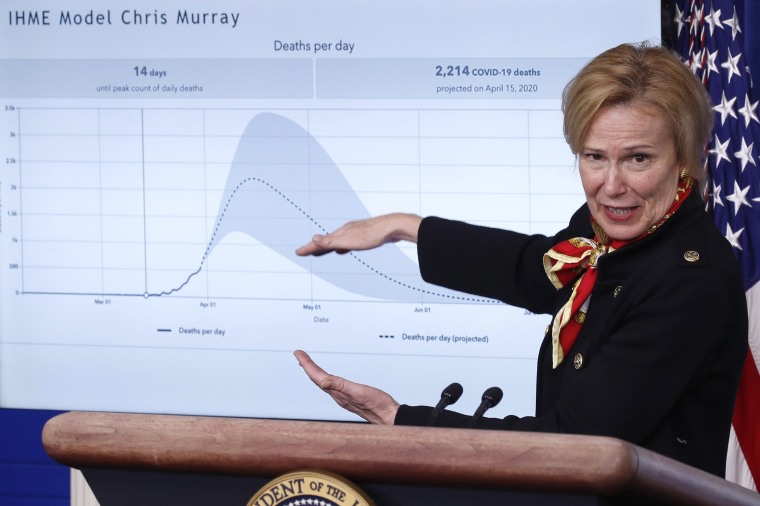As many as 240,000 Americans could die of coronavirus even if containment measures are followed "almost perfectly," a senior U.S. official has warned.
Modelling showed the disease could kill between 100,000 and 240,000 people if Americans stay at home and limit their contact with others, Dr. Deborah Birx, the White House coronavirus coordinator said on Tuesday.
Without social distancing measures, the model predicted between 1.5 and 2.2 million deaths.
President Donald Trump described the estimated death toll as "sobering.”
Elsewhere in the world, evidence emerged that the pandemic may be easing.
Birx said data from Italy shows after four weeks of strict social distancing measures the country was “beginning to turn the corner.”
Silvio Brusaferro, president of the National Institute of Health in Italy, told reporters that his country's coronavirus curve had reached the stage before the contagion begins to decline.
“The curve shows us that we reached the plateau, evidence which proves that the restrictive measures are working,” said Brusaferro.
Currently in Italy every infected person passes it on to one other, he said, adding that the country was waiting for the contagion index to change from one to zero.
Full coverage of the coronavirus outbreak
And Italy is not the only country to hint at a light at the end of the tunnel.
“We continue noticing an improvement in tendencies since March 25. The percentage of increase in the number of cases has gone down from 20 to 12 percent,” said María José Sierra, deputy at Spain’s emergency coordination center.
The positive statements are part of larger devastating pictures in both Spain and Italy.
The number of confirmed cases of the coronavirus in Spain surpassed 100,000 on Wednesday and the number of dead stood at just over 9,000, according to the country’s Health Ministry.
On Tuesday in Italy, the total number of cases stood at over 105,000, up more than 4,000 on the previous day. The number of total deaths was more than 12,400, an increase of 837 from the previous day.
It is important to note that due to differences in testing strategies between countries, it can be difficult to compare the outbreak country-by-country.
This week China has ramped-up efforts to monitor and control asymptomatic cases due to fears that this population present a significant challenge in controlling the pandemic.
Chang Jile, the director of the Bureau of Disease Prevention and Control at China's National Health Commission, said Tuesday that asymptomatic individuals will be put under mandatory isolation for 14 days.
And on Wednesday, the National Health Commission began including updates about asymptomatic infections in its daily epidemic reports.
The briefing Wednesday said 130 new asymptomatic cases had been reported, with a total of 1367 cases under clinical observation. The number under observation had reduced by 174 cases compared to the previous day, it added.
Elsewhere in Japan, the country is on a brink of a state of emergency as the rate of coronavirus infections continues to rise, its top government spokesman said on Wednesday.
Japan’s Health Ministry reported Wednesday that there had been 220 news cases of the disease and one new death in the past 24 hours, bringing the total number of domestic cases to 2,178 and the number of deaths to 57.
Meanwhile, the United Nations has warned that Covid-19 and its economic impact could contribute to “enhanced instability, enhanced unrest, and enhanced conflict.”
This assessment has led the U.N. to believe that this is “the most challenging crisis we have faced since the Second World War,” United Nations Secretary-General António Guterres warned on Tuesday.
The coronavirus will bring a recession that “probably has no parallel in the recent past,” he added.
The Associated Press and Reuters contributed to this report.
